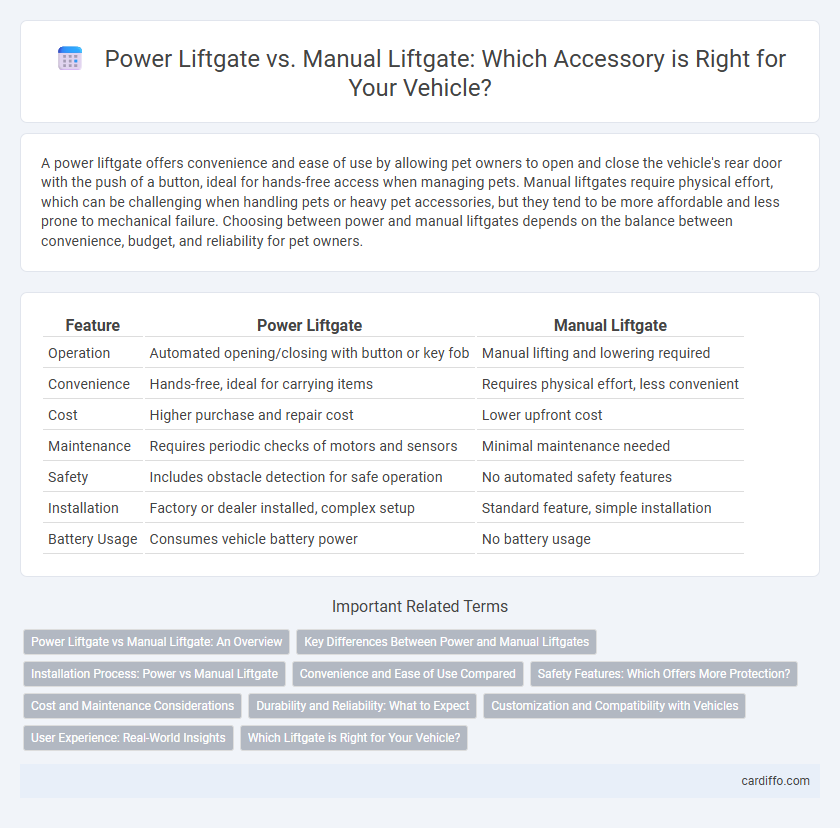A power liftgate offers convenience and ease of use by allowing pet owners to open and close the vehicle's rear door with the push of a button, ideal for hands-free access when managing pets. Manual liftgates require physical effort, which can be challenging when handling pets or heavy pet accessories, but they tend to be more affordable and less prone to mechanical failure. Choosing between power and manual liftgates depends on the balance between convenience, budget, and reliability for pet owners.
Table of Comparison
| Feature | Power Liftgate | Manual Liftgate |
|---|---|---|
| Operation | Automated opening/closing with button or key fob | Manual lifting and lowering required |
| Convenience | Hands-free, ideal for carrying items | Requires physical effort, less convenient |
| Cost | Higher purchase and repair cost | Lower upfront cost |
| Maintenance | Requires periodic checks of motors and sensors | Minimal maintenance needed |
| Safety | Includes obstacle detection for safe operation | No automated safety features |
| Installation | Factory or dealer installed, complex setup | Standard feature, simple installation |
| Battery Usage | Consumes vehicle battery power | No battery usage |
Power Liftgate vs Manual Liftgate: An Overview
Power liftgates offer hands-free convenience and enhanced security with remote or button activation, while manual liftgates require physical effort to open and close. The power liftgate integrates advanced sensors and motors to ensure smooth, automated operation, ideal for users with limited mobility or those frequently handling cargo. Manual liftgates provide a cost-effective, reliable option without battery dependency, suitable for budget-conscious buyers or those preferring simpler mechanisms.
Key Differences Between Power and Manual Liftgates
Power liftgates operate electronically, allowing users to open and close the trunk with a button or key fob, enhancing convenience and accessibility. Manual liftgates require physical effort to lift and lower, offering simplicity and lower cost but less ease of use, especially when hands are full. Power liftgates often include adjustable height settings and safety sensors, features typically absent in manual models.
Installation Process: Power vs Manual Liftgate
Power liftgate installation involves integrating an electronic motor system, wiring harness, and a control module, requiring detailed alignment and calibration to ensure smooth automated operation. Manual liftgate installation is simpler, typically involving the attachment of hinges and mechanical support rods without electrical components, resulting in a quicker, less complex process. Professional installation is often recommended for power liftgates due to the precision needed in electrical and sensor configurations, whereas manual liftgates can be installed with basic mechanical skills.
Convenience and Ease of Use Compared
Power liftgates offer superior convenience by enabling hands-free operation through key fob or foot-activated sensors, reducing the effort needed to open and close the liftgate. Manual liftgates require physical lifting and lowering, which can be cumbersome, especially when carrying groceries or heavy items. The power liftgate's automated system enhances ease of use, particularly for individuals with limited strength or mobility.
Safety Features: Which Offers More Protection?
Power liftgates feature advanced safety sensors that detect obstacles and automatically stop or reverse the door to prevent injury, providing enhanced protection compared to manual liftgates. Manual liftgates rely solely on the user's control, increasing the risk of accidental slams or pinching injuries without automated safety mechanisms. Safety-conscious drivers often prefer power liftgates for their built-in collision avoidance and ease of operation, reducing potential harm during use.
Cost and Maintenance Considerations
Power liftgates typically cost more upfront due to their advanced motorized mechanisms and electronic components, which can increase repair expenses over time. Manual liftgates have lower initial costs and simpler maintenance requirements, reducing the likelihood of expensive fixes. Choosing between the two depends on balancing convenience against potential long-term maintenance costs and budget constraints.
Durability and Reliability: What to Expect
Power liftgates offer enhanced durability with robust electric motors and reinforced hinges designed to withstand frequent use without mechanical failure. Manual liftgates rely on simpler mechanical components that may wear faster under repetitive force, increasing the likelihood of hinge or latch issues over time. Reliability in power liftgates is supported by advanced sensors and automatic closing features, reducing the risk of damage from improper handling compared to manual models.
Customization and Compatibility with Vehicles
Power liftgates offer enhanced customization options such as adjustable opening heights and remote operation, improving convenience for users. Manual liftgates have limited customization but are generally more compatible with a wider range of vehicles due to simpler mechanical designs. Vehicle compatibility for power liftgates depends on electrical system integration and may require specific make and model adaptations, while manual liftgates fit broader vehicle types without complex modifications.
User Experience: Real-World Insights
Power liftgates enhance user experience by offering hands-free operation and easier access, especially when carrying groceries or luggage. Manual liftgates require physical effort and can be challenging for individuals with limited strength or mobility. Real-world insights reveal that power liftgates improve convenience and safety, reducing the risk of injury and enhancing overall vehicle usability.
Which Liftgate is Right for Your Vehicle?
Choosing between a power liftgate and a manual liftgate depends on your daily needs and vehicle usage. Power liftgates offer hands-free convenience and enhanced accessibility, ideal for frequent loading or heavy items. Manual liftgates provide a cost-effective, straightforward option with fewer maintenance concerns, suitable for occasional use or budget-conscious buyers.
Power Liftgate vs Manual Liftgate Infographic

 cardiffo.com
cardiffo.com